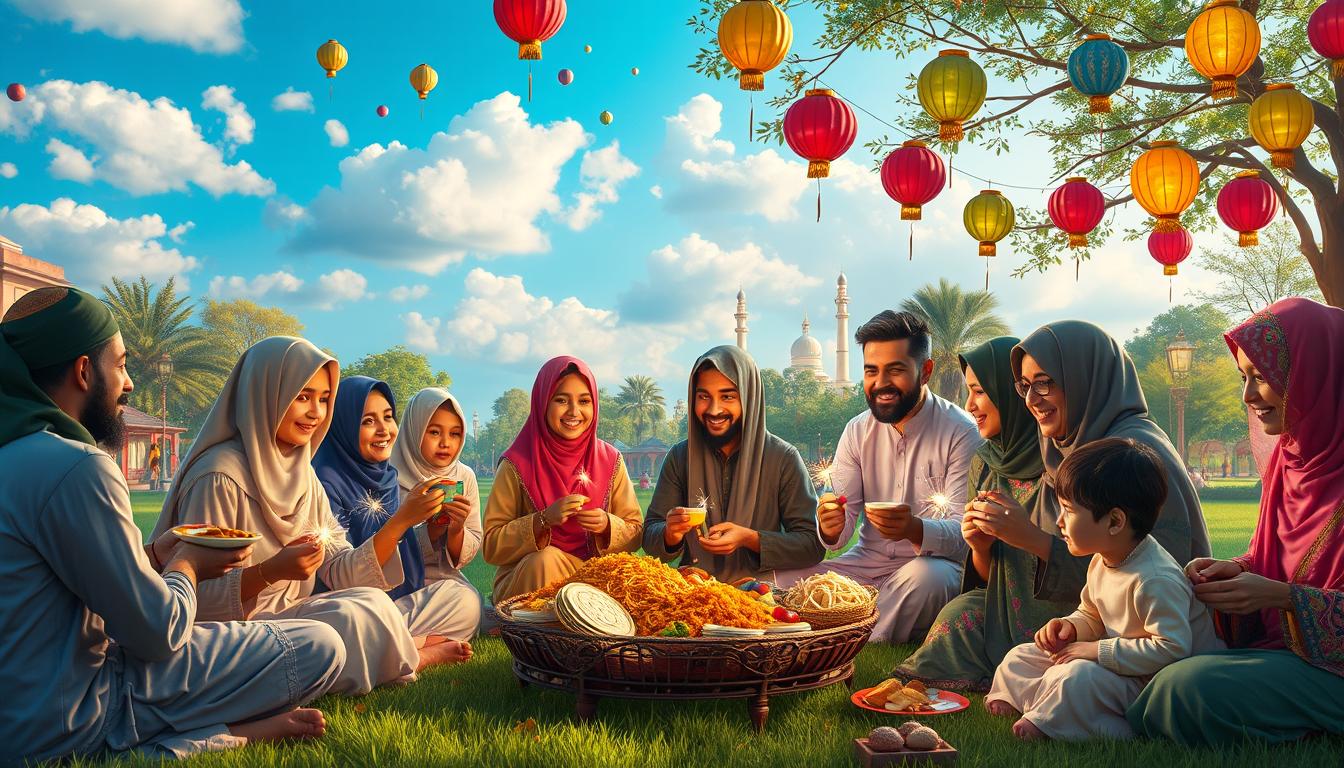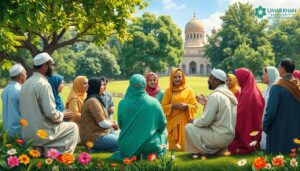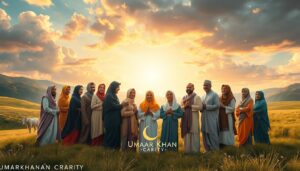We welcome you to join us in celebrating Eid. It’s a joyous occasion that brings families and communities together. We mark the end of Ramadan, the Islamic holy month of fasting, with Eid al-Fitr festivities. This festival promotes unity, gratitude, and inclusivity.
Eid Celebrations are a time to reflect on our Islamic holiday customs. These customs help us connect with our faith and each other. As we prepare for Eid al-Fitr, we focus on charitable giving, special prayers, and community gatherings.
Eid al-Fitr is a significant occasion for Muslims worldwide. We are proud to be part of this community. Our Eid Celebrations are filled with joy, gratitude, and giving. We invite you to join us in this special occasion.
Key Takeaways
- We celebrate Eid al-Fitr as a significant Muslim festival that marks the end of Ramadan.
- Eid Celebrations are a time for unity, gratitude, and inclusivity.
- Our Islamic holiday customs are an important part of our faith and our heritage.
- Eid al-Fitr festivities are a celebration of our faith and our community.
- We believe in the importance of charitable giving and community gatherings during Eid.
- Eid Celebrations are a time for joy, gratitude, and giving.
- We invite you to join us in celebrating Eid and to be a part of our community.
Understanding Eid: Its Significance and Meaning
Understanding Eid is key for new Muslims to enjoy this celebration fully. Eid ul Adha traditions are a big part of the Islamic calendar. Eid family gatherings are a time for loved ones to come together and strengthen their bonds.
The history and significance of Eid show that Eid prayer rituals are central. The Eid prayer has two rakats and can be performed in fields, halls, or mosques. In Sunni Islam, there are three Takbirs at the start of the first rakat and three before rukūʿ in the second rakat.
Here are some key facts about Eid al-Fitr and Eid al-Adha:
- Eid al-Fitr marks the end of Ramadan.
- Eid al-Adha is expected to take place between 16 and 20 June in 2024, lasting for four days and coinciding with the Hajj pilgrimage to Mecca.
- Eid family gatherings are an essential part of the celebration, where loved ones come together to share meals and exchange gifts.
By understanding Eid, we can see its beauty and the importance of Eid prayer rituals in bringing people together. As we explore Eid, we hope to inspire a sense of community and shared responsibility among our readers.
| Eid Celebration | Traditions | Significance |
|---|---|---|
| Eid al-Fitr | Attending prayers at the mosque, making donations to charity, and sharing large meals with family and friends. | Marking the end of the holy month of Ramadan. |
| Eid al-Adha | Performing the Hajj pilgrimage to Mecca, sacrificing an animal, and distributing meat to the poor. | Commemorating the willingness of the Prophet Ibrahim to sacrifice his son. |
Celebrating Eid as a New Muslim: First Steps
As Eid approaches, we invite new Muslims to join in the fun. It’s a time to share with family and friends. Activities include Eid feast preparations, Eid clothes shopping, and Eid community events.
To enjoy Eid fully, consider these steps:
- Learn about Eid’s meaning and traditions.
- Join Eid community events to meet other Muslims.
- Make traditional Eid foods to share with loved ones.
- Buy new Eid clothes for the celebrations.
These actions help new Muslims feel the joy of Eid. They also feel part of the Muslim community. We wish for Eid to unite people and create unforgettable memories.
Traditional Eid Practices Around the World
We celebrate Eid al-Fitr with lots of joy, focusing on Eid family gatherings. Exploring Eid traditions shows us how different cultures celebrate. Islamic holiday customs are unique in each place.
In many places, special sweets and dishes are key to Eid celebrations. In Turkey, Baklava and Turkish delight are given as gifts during Eid, known as Seker Bayrami. In Iraq and Saudi Arabia, kleichas, sweet biscuits with nuts and dates, are loved during Eid.
Here are some traditional Eid dishes from around the world:
- In Yemen, Bint al sahn, a honey cake with nigella seeds, is a favorite Eid dessert.
- In Russia, Manti, dumplings filled with seasoned meat, are a popular Eid dish.
- In China, You Xiang, fried flour, water, and yeast patties, are enjoyed during the Eid feast.
As we celebrate Eid together, we learn the value of cultural exchange. Sharing traditions helps us build stronger, more caring communities.
| Country | Traditional Eid Dish |
|---|---|
| Turkey | Baklava and Turkish delight |
| Yemen | Bint al sahn |
| Russia | Manti |
Giving Back: The Importance of Zakat
As we join in Eid prayer and community events, we remember to give back. Many Muslims shop for new clothes for Eid. Yet, we must not overlook Zakat, a key part of Islamic practice.
What is Zakat?
Zakat is giving a part of your wealth to those who need it. It’s a must for Muslims during Eid. In the US, it’s about $10 to $15 per person. In the UK, it’s £5 to £7.
This act helps the poor and cleanses our souls. It also strengthens our communities.
How to Fulfill Zakat During Eid
To meet Zakat during Eid, Muslims can donate to good causes or help those in need directly. Here are some ways to give back:
- Donating to food banks or organizations that help the poor
- Volunteering at local events or charities
- Joining Eid events that focus on giving and kindness
By giving back, we make our communities more caring and fair. This truly captures the essence of Eid.
Connecting with the Community
We think it’s key to connect with others during Eid. Events like festivals and fairs are great for this. They let us meet people who share our values and traditions. Plus, they offer a chance to enjoy food and drinks together.
There are many ways to join in the Eid spirit. We can go to local Eid events and gatherings. This includes Eid prayers and festivals. We can also spend time with family, sharing meals and stories.
Volunteering at charities is another way to celebrate Eid. It helps those in need and shows our kindness.
Being part of these activities makes our community stronger. We learn about different cultures and traditions. We also get to share our own with others.
Some good things come from connecting with the community during Eid. For example:
- Building stronger relationships with family and friends
- Learning about different cultures and traditions
- Sharing our own culture and traditions with others
- Promoting understanding, respect, and unity among people of different backgrounds
In summary, connecting with the community is vital for Eid celebrations. By joining in Eid events, gatherings, and feast preparations, we build stronger bonds. We also foster understanding and unity among diverse groups.
Umar Khan Charity Organization: Making a Difference
As we celebrate Eid al-Fitr, we remember the value of giving back. The Umar Khan Charity Organization supports vulnerable communities. We aim to change lives through faith-based work, staying true to Islamic values.
During Eid, we help with Eid clothes shopping and other needs. We believe everyone should celebrate with dignity and joy. Our team works hard to make sure no one is left out.
Here are some ways we help:
- Providing food and clothing to those in need
- Offering educational programs and workshops
- Supporting community development projects
We encourage you to help us make a difference. Whether it’s volunteering or donating, every bit helps. Together, we can build a better future for everyone.
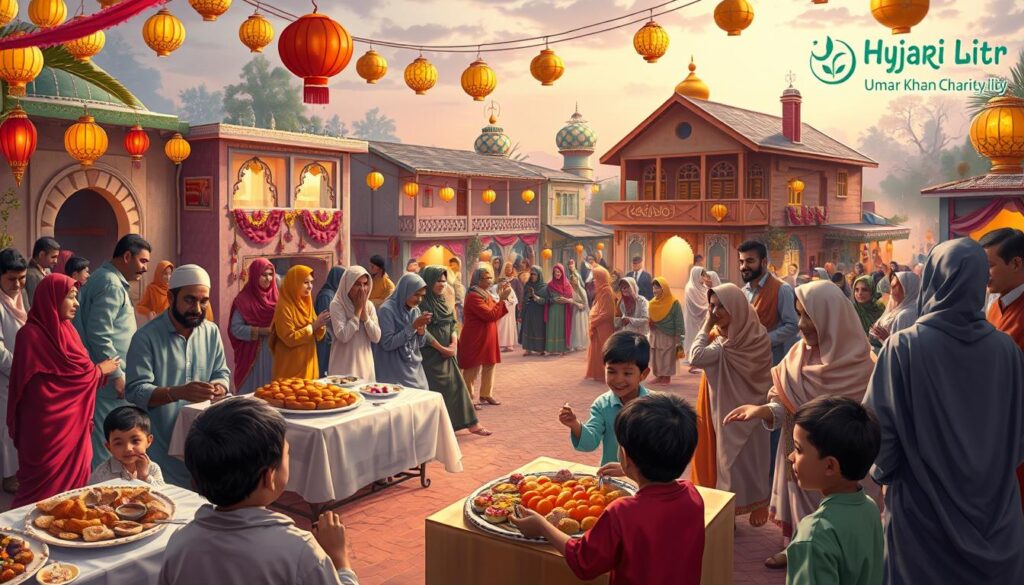
Getting Involved: Volunteering and Donations
We urge Muslims to volunteer and donate to help others during Eid. It’s a chance to positively impact vulnerable communities. Eid events and family gatherings are perfect for giving back.
There are many ways to help. You can donate to trusted organizations or volunteer your time and skills. This can greatly improve the lives of those in need.
- Volunteering with local charities and organizations
- Donating to reputable causes and campaigns
- Participating in Eid community events and Eid family gatherings
Together, we can build a more caring community. Let’s make this Eid a time filled with joy, generosity, and kindness.
Tips for a Joyous and Meaningful Eid
As Eid approaches, we think about how to make it special. We want to share tips to help you enjoy this holiday. Eid is a time for joy, reflection, and celebration. There are many ways to make it memorable.
Start by getting ready for Eid feast preparations. Cook traditional dishes and decorate your home. Eid clothes shopping is also fun. Choose beautiful outfits for the day. Plus, join Eid community events to connect with others.
Here are some tips for a joyous and meaningful Eid:
- Start with Eid feast preparations by planning and cooking traditional dishes
- Go Eid clothes shopping to choose new and beautiful outfits
- Participate in Eid community events to connect with others and strengthen our sense of community
By following these tips, we can make our Eid celebration joyful and meaningful. It will be filled with love, laughter, and connection. 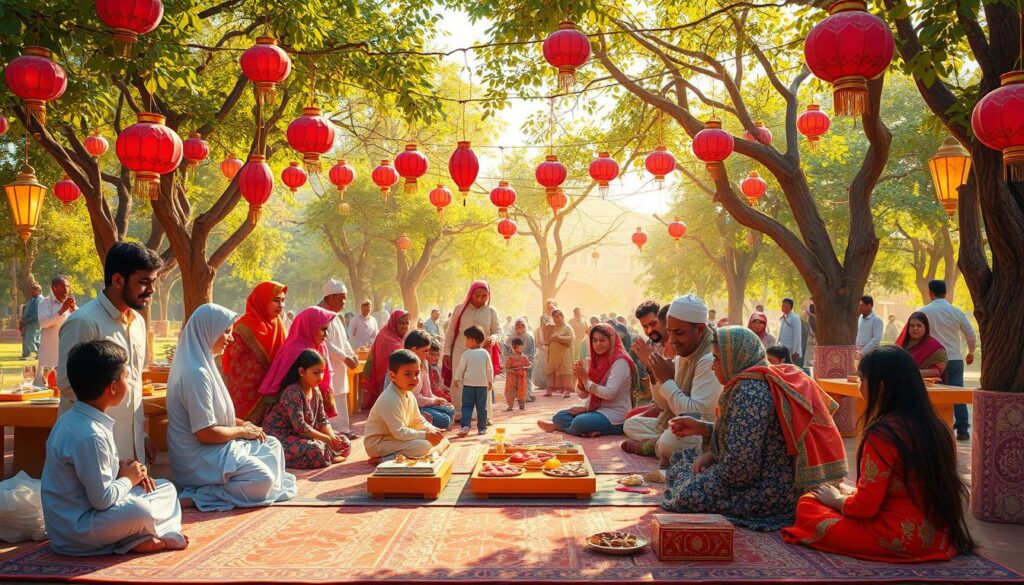
| Activity | Description |
|---|---|
| Eid feast preparations | Cooking traditional dishes and decorating the home |
| Eid clothes shopping | Choosing new and beautiful outfits to wear on the special day |
| Eid community events | Participating in events to connect with others and strengthen our sense of community |
Resources for Further Learning About Eid
As you celebrate Eid, we suggest exploring many resources to learn more. You can find books, articles, online communities, and social media groups. These can help you dive deeper into the traditions and customs of Eid al-Fitr and Eid al-Adha.
Connecting with others through their stories, recipes, and experiences can create lasting memories. It also builds a sense of community during Eid. Whether you’re new to Eid or have celebrated it for years, there’s always more to learn.
We hope this article has inspired you to embrace Eid’s joy and togetherness. By learning, sharing, and connecting with others, you’ll grow to appreciate the Islamic faith more. You’ll also understand the diverse ways Eid is celebrated worldwide.

